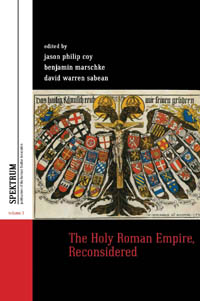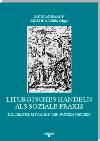


.gif)
.jpg)

.jpg)



.jpg)
.jpg)
.jpg)
David M. Luebke is a historian of early modern Europe whose work focuses on the
religions and political cultures of ordinary people the German-speaking lands.
His latest book—Hometown
Religion: Regimes of Coexistence in Early Modern Westphalia, 1535-1650—appeared in 2016 with the University of Virginia Press.
In 2017, Hometown Religion was awarded the Gerald Strauss Prize for the “best book published in English in the field of German Reformation history.” He is also series editor of Spektrum:
Publications of the German Studies Association and series co-editor of Studies in Central European Histories.
Selected Publications:
Hometown Religion: Regimes of Coexistence in Early Modern Westphalia (Charlottesville: University of Virginia Press, 2016).
Archeologies of Confession: Writing the German Reformation, 1517-2017, co-edited with Carina L. Johnson, Marjorie E. Plummer, and Jesse Spohnholz (New York: Berghahn, 2017).
Mixed Matches: Transgressive Unions in Germany from the Reformation to the Enlightenment, co-edited with Mary Lindemann (New York: Berghahn, 2014).
Conversion and the Politics of Religion in Early Modern Germany, co-edited with Jared Poley, Daniel C. Ryan, and David W. Sabean (New York: Berghahn, 2012).
The Counter-Reformation: Essential Readings
(Oxford: Blackwell Publishers, 1999).
His Majesty's Rebels: Communities, Factions and Rural Revolt in the Black Forest,
1725-1745 (Ithaca: Cornell University Press, 1997).
“Customs
of Confession: Managing Religious Diversity in Late Sixteenth- and Early Seventeenth-Century
Westphalia,” in Howard Louthan, Gary Cohen, and Franz Szabo,
eds., Diversity and Dissent: Negotiating Religious Difference in Central
Europe, 1500-1800 (New York: Berghahn, 2011).
“Confessions of the Dead: Interpreting Burial Practice in the Late Reformation,”
Archive for Reformation History 101 (2010), 55-79.
“Participatory
Politics,” in Peter Wilson, ed., A Companion to the Eighteenth Century
(Oxford: Blackwell Publishers, 2008), 479-494.
“Of Liberty and the Upstalsboom: Urban-Rural Alliances and the
Symbols of Freedom in Early Modern East Frisia,” in Christopher Ocker
et al., eds., Politics and Reformations: Essays in Honor of Thomas A. Brady,
vol. 2, Communities, Polities, Nations, and Empires (Leiden:
E.J. Brill, 2007), 259-282.
“How to Become a Loyalist: Petitions, Self-Fashioning, and the Repression
of Unrest (East Frisia, 1725-1727),” Central European History
38/3 (2005): 353-383.
“Signatures
and Political Culture in Eighteenth-Century Germany,” Journal of Modern
History 76 (2004): 497-530.
“Symbolische Konstruktionen politischer Repräsentation im ländlichen
Ostfriesland, 1719-1727,” Westfälische Forschungen 53 (2003):
183-214.
“Erfahrungen von Leibeigenschaft: Konturen eines Diskurses im Südschwarzwald,
1660-1740,” in Jan Klußmann, ed., Leibeigenschaft: Bäuerliche
Unfreiheit in der frühen Neuzeit (Cologne: Böhlau, 2002), 175-197.
“Frederick the Great and the Celebrated Case of the Millers Arnold (1770-1779):
A Reappraisal,” Central European History 32/4 (1999): 379-408.
“‘Naive Monarchism’ and Marian Veneration in Early Modern
Germany,” Past & Present 154 (1997): 71-106.
My books:


.jpg)

.jpg)
.jpg)
My chapter contributions:
These books have appeared in a series I edit, called Spektrum: Publications of the German Studies Association
These books have appeared in a series I co-edit with with Celia Applegate, titled Studies in Central European Histories